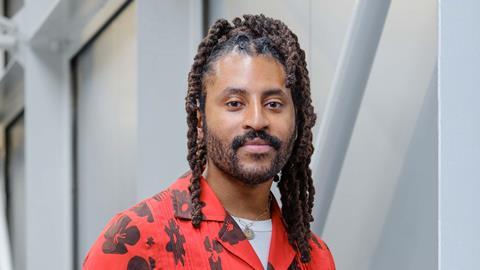Speaking to Screen the day before he heads to Cannes Film Festival for the premiere of Agnieszka Smoczynska’s The Silent Twins, costume designer Cobbie Yates describes the film as “a career-defining moment”.
Adapted from the novel by Marjorie Wallace about real-life Black twins June and Jennifer Gibbons, who grew up in Wales in the 1970s and did not engage in verbal communication, the project struck a personal chord with Yates, whose parents come from Ghana. “The story connected to my own understanding of what it means to be a Black person living in the UK and fusing those elements,” he says.
The twins were unable to express themselves verbally, so the clothes took on a greater resonance. “Colour became a tool for me to be able to support this silent expression within their costumes,” says Yates. “I was able to dial up particular moments in the script, like when they’re craving independence or there’s a clear power shift between them.”
The south Londoner has worked as a stylist on magazines and music videos since the age of 17, where he found he could “create characters” through costume. “I kept coming back to the story elements of styling, and the narrative part felt like an important area to explore,” he says.
Yates formed the Orange Soda Film Club — screening Black films in various London venues — with friends around 2013, which provided the catalyst for the move to the screen: after he met director Shola Amoo at a club screening, Yates went on to design the costumes for Amoo’s 2016 feature debut A Moving Image. Since then, Yates has worked on features such as Pirates, directed by his brother Reggie Yates, and TV shows including Sky’s financial drama The Fear Index, Left Bank Pictures/ITV thriller miniseries Without Sin and upcoming Netflix drama Palomino. “Once I find a story I can relate to, I allow myself to be free and it doesn’t feel like work anymore,” he says.
Having followed a non-traditional route into the industry, Yates is dedicated to “asking questions, being provocative, using the tools I have to evolve and learn. As a young Black man growing up in Deptford, I didn’t see enough of myself in culture. I want to open up those road blocks. I want to work with a diverse community and on films that are considering every element and challenging the norm.”
Contact: Michelle Arnold, Dench Arnold
















![[L-R]: Amanda Villavieja, Laia Casanovas, Yasmina Praderas](https://d1nslcd7m2225b.cloudfront.net/Pictures/274x183/6/4/1/1471641_pxl_20251224_103354743_618426_crop.jpg)









No comments yet